Beginners Guide to Modifying an MK7 GTI
Want to modify your 2015-2018 MK7 VW GTI? Start here!
The 2015-2018 Volkswagen MK7 GTI is a sporty hatch. It has an updated turbocharged 2.0-liter 4-cylinder motor. The torque is up in a big way, from 207 lb-ft last year to a whopping 258 lb-ft. It’s a difference you’ll feel every time you punch the gas. Although horsepower is little changed at 210 (the Mk6 made an even 200), that extra torque shoves you back into your seat like a proper sports car engine.
Where do you start? What modifications are out there?
The MK7 GTI is a strong platform to begin with. If you are interested in upgrading to either go faster, sit lower or sound better, this guide will give you some general direction.

Drivetrain Performance (Motor, Exhaust, Intake, transmission)
ECU Tuning: also known as “chipping”, is a way to gain performance by making changes to your cars software to allow it to put out more power. Various stages of tuning give you various levels of power. This is done by something called “flashing” from companies like APR, Unitronic, GIAC, Revo, etc. These tunes can be done in around an hour, you would need to find a software dealer in your area and take your car to their shop. These can be done on completely stock cars and when you decide to modify your car more you can get a re-flash to work with the parts you put on your car. A stage 1 tune could yield up to 50hp without any other modification!
MK7 GTI and Golf Tunes and Tuners
Turbo back/Cat-back Exhaust: An exhaust will free up the airflow out the back of your car increasing performance slightly as well as increasing the sound that your car makes. A turbo back exhaust is exactly what it sounds like, a new exhaust system from the turbo back. These can either come with a new high flow catalytic converter or you can get one without a catalytic converter for track use only. A Turbo back by itself will give your car more power and a much louder sound, typically most cars need a computer tune as well to gain the most out of the exhaust.
A cat-back system is from the stock catalytic converter back, this type of system will not gain as much power but will give your car a louder sound.
Please note that because of a redesign to the rear bumper in the 2018 MK7.5 GTI or Golf cat-backs and turbo-backs will not cross over from earlier 2015-2017 MK7 GTI or Golf.
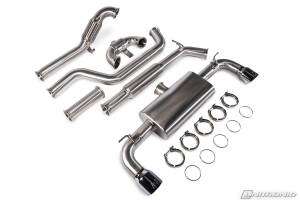
The Unitronic Turbo-Back Exhaust made for the MK7 GTI fits 2015-2017 models. Because of an updated rear bumper, this exhaust will not fit the new 2018 MK7.5 vehicles.
Motor Mounts: help put more power down and reduce wheel hop. Depending on the mileage, motor mount will help increase the performance of your car by reducing the engine movement. Typically stock motor mounts will begin to deteriorate and you will lose that tight feeling that your car once had. The MK7 GTI has two mounts, an Engine mount and Transmission mount.
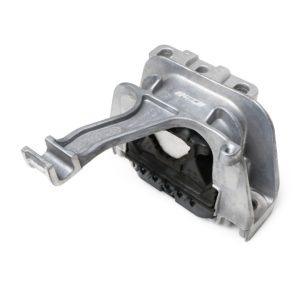
Show here, the CTS Turbo 60 Durometer MQB Engine Mount fits the MK7 GTI and Golf as well as the 8V A3 and S3. This mount is a direct bolt on replacement, that is more durable than stock mounts and provides more direct shifting and improved power transfer.
Turbo Outlet Pipe: replaces the stock pancake pipe allowing for a 4-5 HP gain. Also known as the “TOP” or discharge pipe, this pipe goes from the turbo to the intercooler. The stock pipe is known as the “pancake pipe” because it is very restrictive compared to other aftermarket pieces.
MK7 GTI/Golf Throttle Pipes & Turbo Outlet Pipes
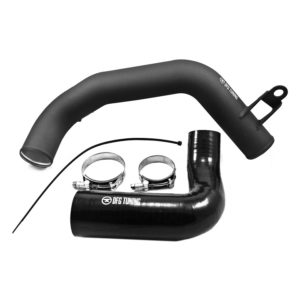
Shown here, the DFG Tuning MQB Discharge Pipe System fits the MK7 GTI and Golf platform as well as the 8V A3/S3 platform and the MK3 TT platform. It uses larger diameter piping and a straighter design compared to the more restrictive OE design.
Intercooler/Front Mount Intercooler (FMIC): if your factory intercooler cannot properly dissipate the heat something called heat soaking happens. This means that your factory intercooler cannot cool the incoming air fast enough, which results in hot air being pushed into the motor, Hot air is less dense which = less power. Most cars don’t need an aftermarket intercooler until they are stage 2 and above. The stock intercooler is fine until higher power levels are reached. Aftermarket FMIC have a larger core and piping allowing for better
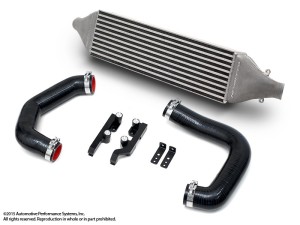
This Neuspeed Front Mount Intercooler for the MK7 GTI is for vehicles with secondary air injection. Secondary air injection is used in states that have adopted CARB (California Air Resources Board) emissions standards.
Intake: When added with tuning, intakes will produce performance gains. They do this by increasing the diameter and flow of the piping allowing for more air to enter the turbo. Some systems have heat shields or actual intake boxes that also help reduce the heating of the intake air, this adds to cool air is denser air which makes more power.
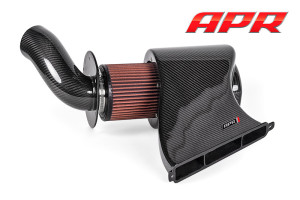
The APR MQB Carbon Fiber Intake System fits 2015+ MK7 GTI and Golf vehicles as well as 2015+ 8V A3 and S3 vehicles and 2016+ MK3 TT vehicles. It’s a popular system because of its easy installation and horsepower gains, and its all carbon fiber appearance.
Clutches: a stock clutch is not meant to be able to stand added power. Upgrading it will ensure reliability and longevity to your clutch.
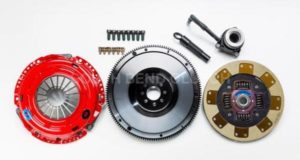
The South Bend Stage 3 Endurance Clutch Kit with Flywheel for the MK7 GTI and Golf R utilizes a single mass flywheel which lowers the rotational mass and will give you a more aggressive “bite”. This kit was featured on our MK7 GTI project car.
Diverter Valve: A Diverter valve is there to protect your turbo from compressor surge. Compressor surge is when unused air from the intake is redirected backward when the throttle closes, if the Diverter valve wasn’t there, this air could damage the turbo. Some Stock units will fail, allowing for boost leaks, which can hurt performance. Replacing the DV is a good maintenance and performance item, it will ensure that your car will hold boost without any issues once you add more power. Most aftermarket units replace the stock plastic valve with a metal one and can hold up to 30lbs of boost
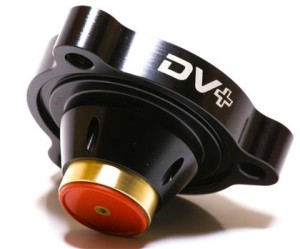
The GFB DV+ Diverter Valve fits most 2.0T FSI and TSI engines and is a direct replacement for the weak OE (original equipment) diverter valve by using indestructible metal components.

Suspension
Lowering Springs: modest 1” to 2” drop, replace stock springs and reuse the stock struts and shocks. This is a great way to lower your car without breaking the bank or making your car too low.
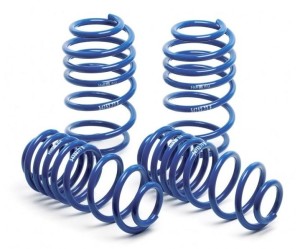
Coilovers: Are exactly what they sound like, Coil springs and shocks in one package. When you buy coilovers you are getting replacement springs and shocks, so it is a complete package allowing for straight forward installation. Coilovers can be height and dampening adjustable. Height adjustable coilovers will be cheaper vs height and dampening adjustable kits.
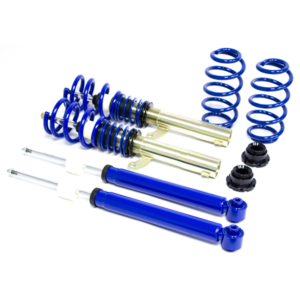
The Solo-Werks S1VW012 Coilover Kit is a popular upgrade for the MK7 platform. They have a lowering range of 1.4 inches to 2.5 inches in the front and 1.4 inches to 2.75 inches in the rear.
Air Ride Suspension: allows you to make the car raise up or lower down at the push of the button using air pressure. These systems use air bags instead of springs to raise the car up and down as well as control ride comfort via air pressure. Other accessories like a compressor and air tank are needed.
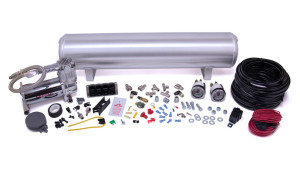
Bushings: much like mounts, they help solidify the driveline and help put more power down. Stock bushings are typically made out of soft rubber meaning they have a lot of compliance when you are pushing your car hard. Upgrading to a stiffer rubber or polyurethane bushing allows for less movement in the bushing meaning that motion is being transferred to the road or the proper suspension parts, thus increasing the performance and traction of your suspension.

Sway Bar: there are options for the front and rear sway bars, give your car roll stiffness. Also called stabilizer bars because they help stabilize the car in a turn, too much roll hurts traction and can make the car unpredictable. Aftermarket sway bars will help reduce this.
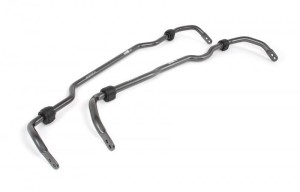
Chassis Braces: helps reduce/remove chassis twist and flex. This not only helps performance but by stiffening up the car you gain better traction and handling
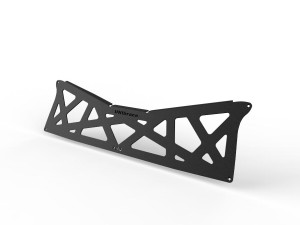
Brakes
OEM:
- Lines: Stainless steel brake lines give the user a better braking feel from less flex in the line. Stock brake lines are made out of rubber and can flex when being used hard giving the pedal a squishy feeling.
- Pads: More aggressive brake pads will increase the stopping power of your stock brakes.
- Fluid: High temperature brake fluid for a higher boiling point. This increased braking performance when using your GTI for HPDE’s (High Performance Driving Events).
Aftermarket: big brake kits have larger rotors, which increase stopping response, along with more clamping power due to more pistons in the caliper. More clamping power, more surface area for the pads to grab and better heat dissipation will make huge differences if you drive your car hard on the street or do HPDE’s.
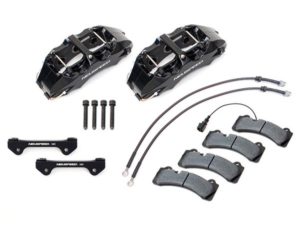
Shown here is the Neuspeed 6-Piston 340mm Big Brake Kit for the 2015+ S3, 2016+ TTS, and the MK7 Golf R and GTI (with performance pack) replaces the inferior factory calipers with Forged 6-Piston Caliper kit that will improve pedal modulation and stopping performance significantly.

